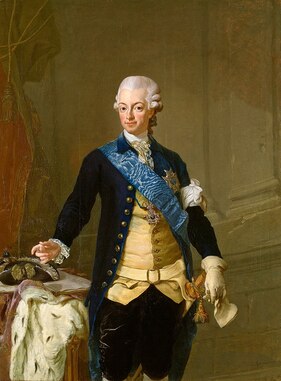 Gustav III of Sweden
Gustav III of Sweden Sweden's Constitution of 1772 (Swedish: regeringsform, "Instrument of Government") took effect through a bloodless coup d'état, the Revolution of 1772, carried out by Gustav III, who had become king in 1771. It established once again a division of power between the parliament and the king. The period came to be known as the Gustavian era. This was a response to a perceived harm wrought upon Sweden by a half-century of parliamentarism during the country's Age of Liberty practiced according to the Instrument of Government (1719), as many members of the Swedish parliament then used to be bribed by foreign powers.
Formally, the 1772 Constitution was adopted by the Parliament (Riksdag) on 21 August 1772, but this took place as members of the Parliament and the Privy Council were under threat by the royal garrison on order by King Gustav III outside of Stockholm Palace, where the Parliament and Privy Council were assembled in different parts of the palace. Leading members of the Caps party who sat in the Privy Council (as well as in Parliament) were arrested, as they were locked up in the Privy Council Room and released shortly after the adoption of the constitution. The 1772 Constitution was partly inspired by the current Enlightenment ideas of separation of powers by Montesquieu, but also based on earlier traditions in Sweden, especially from the era of King Gustav II Adolf, and two of the offices of the ancient Great Officers of the Realm were revived.
King Gustav III also cherished other Enlightenment ideas (as an enlighted despot) and repealed torture, liberated agricultural trade, diminished the use of death penalty etc. The somewhat later Freedom of the Press Act of 1774, a part of the constitutional law and largely edited by Gustav III, was actually commended by Voltaire. The earlier first Freedom of the Press Act of 1766 was repealed by the Constitution in 1772.
The outcome of the constitution and its deliberately vague formulations, partly attributable to it being written in haste, was however a more or less authoritarian political system more weighted in favor of the king's power. In 1789 it was amended in a still more autocratic direction by the Union and Security Act. In theory, the king was required to "listen" to the privy council of the parliament, but in practice "listening" did not equate with accepting the advice of the elected government. In certain matters the council did have the power to veto an act by the king, but only on a unanimous vote, which was difficulty to achieve. The king did require approval of the parliament to raise taxes, enact new laws and declare war, but again the practice was to present these matters to the parliament as fait accomplis.
So was the 1772 Constitution a better expression of the Rule of Law than the 1720 constitution under which a corrupt parliament was ruining the Swedish economy and frittering away its sovereignty? Arguably it was. While the king did abuse his power, he also instituted reforms that benefited the people. Ultimately, however, the failure of the crown to honor the ideals of the constitution led to its downfall. The 1772 Constitution was replaced by the 1809 Instrument of Government following the defeat in the Finnish War and the removal of King Gustav IV Adolf from the throne.
 RSS Feed
RSS Feed